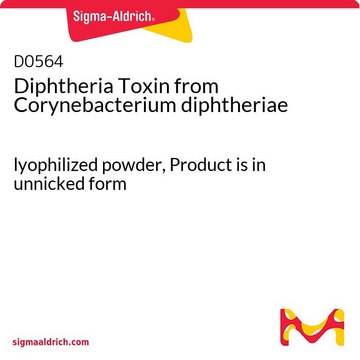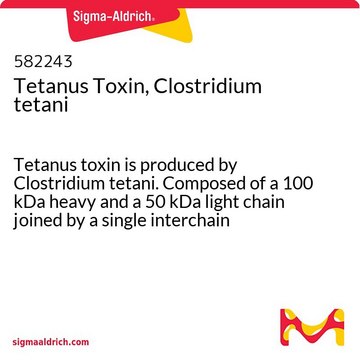322327
Diphtheria Toxin, CRM Mutant
Diphtheria Toxin, CRM197 Mutant, CAS 92092-36-9, is a nontoxic material with a glycine to glutamic acid mutation at amino acid 52 in fragment A, resulting in the complete loss of enzymatic activity.
Synonim(y):
Diphtheria Toxin, CRM Mutant
Zaloguj sięWyświetlanie cen organizacyjnych i kontraktowych
About This Item
Numer CAS:
Kod UNSPSC:
12352202
Polecane produkty
Poziom jakości
Postać
solid
producent / nazwa handlowa
Calbiochem®
warunki przechowywania
OK to freeze
avoid repeated freeze/thaw cycles
Warunki transportu
ambient
temp. przechowywania
2-8°C
Opis ogólny
CRM197 is a nontoxic diphtheria toxin that has a glycine to glutamic acid mutation at amino acid 52 in fragment A, resulting in the complete loss of enzymatic activity. Does not catalyze the ADP ribosylation of EF-2 factor. Immunologically, the CRM197 protein is identical to the wild-type toxin.
Cross-reactive material of diphtheria toxin (CRM197). A nontoxic diphtheria toxin that has a glycine to glutamic acid mutation at amino acid 52 in fragment A that results in complete loss of enzymatic activity. Inhibits smooth muscle cell proliferation in a dose-dependent manner. Immunologically, the CRM197 is identical to the wild-type toxin and is useful as a carrier protein of conjugate vaccines.
Działania biochem./fizjol.
Cell permeable: no
Primary Target
Mutant with loss of enzymatic activity to catalyze the ADP ribosylation of EF-2 factor
Mutant with loss of enzymatic activity to catalyze the ADP ribosylation of EF-2 factor
Reversible: no
Ostrzeżenie
Toxicity: Standard Handling (A)
Postać fizyczna
Lyophilized from 10 mM sodium phosphate buffer, 5% lactose, pH 7.4.
Rekonstytucja
Following reconstitution, aliquot and freeze (-70°C). Stock solutions are stable for up to 1 year at -70°C.
Please refer to vial label for lot-specific reconstitution volume.
Komentarz do analizy
One major band by SDS-PAGE
Inne uwagi
Kusano, I., et al. 2001. Cell Struct. Funct.26, 279.
Kaefer, M., et al. 2000. J. Urol.163, 580.
Gupta, R.K., et al. 1997. Vaccine15, 1341.
Bixler, G.S., et al. 1989. Adv. Exp. Med. Biol.251, 175.
Giannini, G., et al. 1984. Nucleic Acids Res.12, 4063.
Uchida, T., et al. 1973. J. Biol. Chem. 248, 3851.
Pappenheimer, Jr., A.M., et al. 1972. Immunochem. 9, 891.
Kaefer, M., et al. 2000. J. Urol.163, 580.
Gupta, R.K., et al. 1997. Vaccine15, 1341.
Bixler, G.S., et al. 1989. Adv. Exp. Med. Biol.251, 175.
Giannini, G., et al. 1984. Nucleic Acids Res.12, 4063.
Uchida, T., et al. 1973. J. Biol. Chem. 248, 3851.
Pappenheimer, Jr., A.M., et al. 1972. Immunochem. 9, 891.
Informacje prawne
CALBIOCHEM is a registered trademark of Merck KGaA, Darmstadt, Germany
Ta strona może zawierać tekst przetłumaczony maszynowo.
Kod klasy składowania
11 - Combustible Solids
Klasa zagrożenia wodnego (WGK)
WGK 3
Temperatura zapłonu (°F)
Not applicable
Temperatura zapłonu (°C)
Not applicable
Certyfikaty analizy (CoA)
Poszukaj Certyfikaty analizy (CoA), wpisując numer partii/serii produktów. Numery serii i partii można znaleźć na etykiecie produktu po słowach „seria” lub „partia”.
Masz już ten produkt?
Dokumenty związane z niedawno zakupionymi produktami zostały zamieszczone w Bibliotece dokumentów.
Nasz zespół naukowców ma doświadczenie we wszystkich obszarach badań, w tym w naukach przyrodniczych, materiałoznawstwie, syntezie chemicznej, chromatografii, analityce i wielu innych dziedzinach.
Skontaktuj się z zespołem ds. pomocy technicznej








